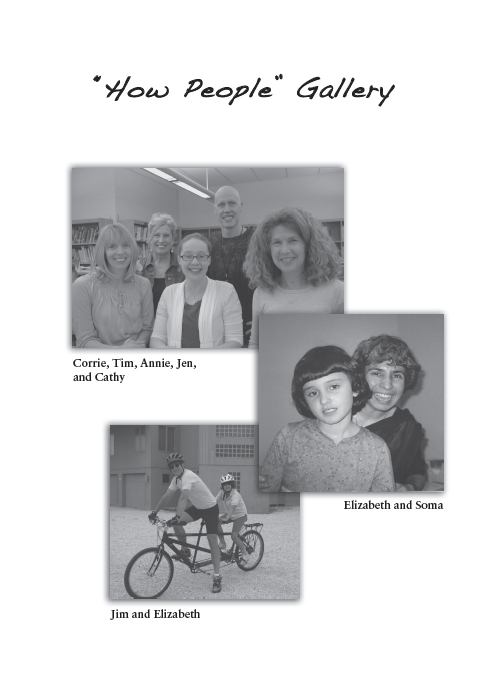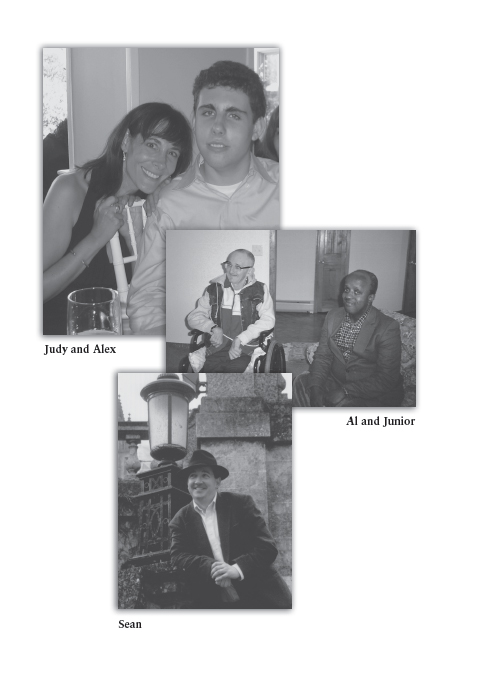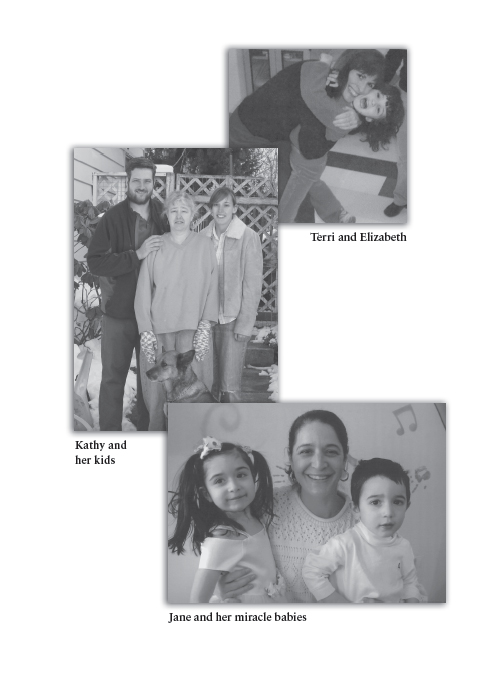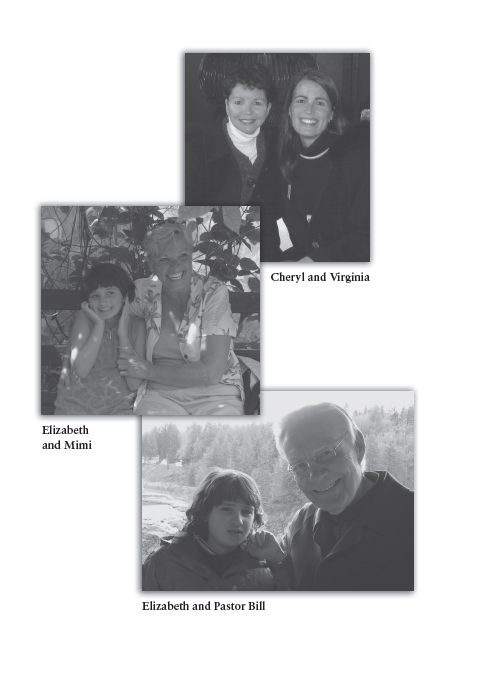I Am in Here (22 page)
Authors: Elizabeth M. Bonker

All the darkness in the world can't extinguish the light from a single candle
.
St. Francis of Assisi
A
s this book goes to print, I want to share a few updates with you.
First, there is some amazing news about Cheryl, my roof badminton friend, who has been in constant pain for more than two years. She tells the story better than I can in this email:
Dear prayer warriors,
God has been moving mountains in my life. I was told by a specialist that what I have is incurable. I told him we were praying and that God knew better. God has led me to a physical therapist in Nevada and he believes I am a good candidate to be cured. Please join me in praying that God gives the therapist the
insight to know what is wrong with me and the ability to fix it. Thank you for all your prayers. God knows mountains could not be moved without them
.
Love, Cheryl
Despite the difficulties of travel for someone who cannot sit without severe pain, Cheryl flew to Nevada and had three days of treatment with the physical therapist. She is now healed.
Cheryl's steadfast faithfulness has been a rock for me during our own crisis these past eighteen months. Elizabeth has not been well. Almost every day, all day, someone has to sit beside her to deflect her fists or knees from hitting her face. She sleeps little at night and often needs me to be with her as she struggles mightily to find the brief moments of rest that sleep affords her.
In spite of her previous success in the mainstream classroom, Elizabeth has needed Terri and me to teach her at home this academic year. For six hours each day, we do ten minutes of an academic subject and then take a five minute break. Because Elizabeth has a photographic memory, she is ahead in all of her classes, and we supplement her studies with college lectures on art and philosophy.
During this time, we traveled to countless specialists, many of whom simply attributed these behaviors to her autism. But I have come to know autism over the past thirteen years, and of course I have come to know Elizabeth as well. This self-injurious behavior is not the autism, nor the Elizabeth that I know. Something else is going on. But, once again, it takes time for the medical science to catch up with our lived experiences of illness. The science just isn't there yet to guide us.
Elizabeth described how it felt for her to endure this suffering during one of her home lessons when she typed, “
Bugs are eating my brains
.”
She had never used this type of disturbing language to describe her pain before, so I was beside myself with worry. At this point, the facial blows were coming every forty seconds, and I was convinced more than ever that something was ravaging her brain. After reading everything I could find on self-injurious behaviors, I asked several doctors if a virus might be the cause. They responded that there was scant support in the medical research literature. Brain viruses are rare.
So the doctors looked elsewhere. Elizabeth had sedated MRI scans and a forty-eight-hour in-hospital EEG, but they found no tumors or evidence of seizures. Finally, I convinced one of our doctors to do a special virus test which would take months to process. With Elizabeth in such agony, how could I not continue searching for the cause as rare as a virus might be?
This was a dark time of trying medication after medication. We just tried to get through each day. Nothing helped very much or for very long. Some medications made her much worse and were immediately discontinued. Every time I placed a new pill in her mouth, I felt terrible because I believed that we were not dealing with the root cause, only its terrible outward effect. Many nights I cried myself to sleep and asked God how I could publish a book about hope when I felt so hopeless.
After one particularly bad meltdown, Elizabeth gave me the equivalent of my dad's “Buck up!” when she typed, “
Get me professional help
.” She was right. Besides focusing on her brain chemistry, we needed help managing the uncontrollable behaviors.
Soon after, we headed to the Kennedy Krieger Institute, part of Johns Hopkins Hospital, for two weeks of intensive, outpatient behavioral treatment. “Intensive” means five hours a day, five days a week in an eight-by-eight-foot padded, windowless, blue room with Elizabeth, three therapists, Terri, and me. Acknowledging Elizabeth's intelligence and seeking her input in the process, the therapists tailored a Cognitive Behavioral Therapy program to help her work through her anger.
The therapists treated Elizabeth as a teammate, not as a silent conscript. They read her poetry and had conversations with her to better understand what made her angry. Not surprisingly, “
treating me like a baby
” and “
taking away my computer
” were at the top of the list. In subtle ways, they acknowledged she was “in there,” and that respect made all the difference to both of us.
During one of our sessions, Elizabeth told us, “
Mickey makes me hit myself
.” I was shocked. We were surrounded by Disney items in that blue padded room because we thought that her usual stable of books and movies would be a comfort to her. But they had become an obsession. The therapists suggested that we think of it as a drug addiction and wean her off of them slowly. Months later, we asked Elizabeth how it felt to be Disney-free, and she typed, “
My head is clear
.”
While our time at Kennedy Krieger did not eliminate the problem behaviors, it gave us techniques to diffuse many situations and deflect the blows if they came. On our last day, Elizabeth typed, “
These people do good work
.”
When we finally got the virus results, I read them with mixed emotions: Elizabeth tested positive. While I am relieved to have a path to pursue, I am afraid to think about the treatment needed for a cure. Once again we are reluctant pioneers in medical science, heading out on yet another journey we
didn't sign up for. Her poetry captures the hopes and fears during these days, weeks, and months of physical, emotional, and spiritual tumult.
 Â
Reflections
 Â
It made my heart bleed
As I felt freed
Destined to stay in pain
But finding myself flying again
What a coincidence
I felt I was drowning in anger. I was feeling hopeless. The anger would not go away.
When I have been at my lowest, God has seen my tears and repeatedly prompted special friends to let me know I haven't been forgotten. These How People have gotten me through: my mother, Sean, Jane, Charlie, Jim, Judy, Fred, Laurie, Cheryl, and so many others who have given me words of encouragement when I sorely needed them.
It was Cheryl who called me one sad Tuesday night when I usually had my prayer time with Pastor Bill. Her loving words poured over me: “I know that I'm not Pastor Bill, but I wanted to make sure that you were not alone tonight.” You see, this was the first Tuesday that Bill wasn't calling me. I was scheduled to be with him that week in Seattle on his eightieth birthday, but his health took a turn for the worse, and his family asked me to postpone my trip. He so yearned to be one with God. Now he finally is.
On one of our last Tuesday calls, Bill told me he was sure that Elizabeth
would
be healed. He could see her well and speaking to us. I remembered this beautiful vision when her virus test results came in. They weren't expected for another month but arrived on the day Bill was laid to rest. I took it as a sign that God hadn't forgotten us.
A few weeks after getting those results, we started a new natural medication that activates the body's immune system to fight viruses. We are early in this treatment, and our history in the autism battle tells us that there are likely to be both triumphs and setbacks ahead of us. But at this moment, after only seven weeks of treatment, Elizabeth is free from the horror of constantly hitting herself. I believe that we are now on the right path for Elizabeth to be fully healed and, finally, to speak. Her recent poems tell me she believes it too.
 Â
Cure for Winter
 Â
I feel His presence all around
In the flowers blooming and the birds returning
The Earth is ready to begin anew
And I am too
My journey with Elizabeth has been one of mind, body, and spirit. Recently she told me she believes she can read my mind. After my initial surprise, I recalled many times when her typing reflected just what I was thinking, even though I was across the room. I wish that I could be in her mind and body for just one moment to see and feel the world as she sees and feels it. As close as we are spiritually, she remains a mystery to me in many ways.
Alfred, Lord Tennyson wrote about the beauty of this mystery in his poetry:
Flower in the crannied wall,
I pluck you out of the crannies,
I hold you here, root and all, in my hand,
Little flowerâbut if I could understand
What you are, root and all, and all and all,
I should know what God and man is.
[1]
This poem has been special to me since my graduation from high school. On that day, I was supposed to give the valedictorian address, and my text was to be a reflection on “Flower in the Crannied Wall” and its notion that although God and our fellow human beings would largely remain a mystery to us, we could nonetheless gain some important insights into that mystery from loving all of God's creation, even the smallest and most overlooked elements.
I never did get to give that speech because I refused to submit it for censorship. Maybe that public muzzling has helped me empathize with Elizabeth a bit more. If nothing else, it shows that Elizabeth and I share the stubborn gene. While the whole affair hurt me deeply at the time, I now see the benefit: it burned that poem into my heart, which has changed the way I see the world.
Elizabeth is my little flower, relentlessly breaking through autism with her poetry. Like the flowers in the sidewalk cracks and crannied walls, she is a quiet miracle. I may never understand her fully, just as I will never fully understand God, but our journey together will continue to be filled with love and awe until it reaches its ultimate, glorious destination. To use the words of Saint Paul, “All that I know now is partial and incomplete, but
then I will know everything completely, just as God now knows me completely” (1 Cor. 13:12 NLT).
Alice in Wonderland sang, “You can learn a lot of things from the flowers.” I know I have. My little flower has taught me to look beyond the cracks in my life and see the beauty in all of God's creation. It's a lesson we can all learn.
Look down for a minute. Do you see only a cracked sidewalk? Look closer. God has left you a love note.




